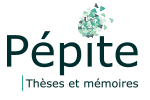Humaniser les soins en maternité ? : Les appropriations du label Initiative Hôpital Ami des Bébés
Introducing a more human approach to maternity care ? : Appropriations of the Baby-Friendly Hospital Initiative quality label
- Naissance
- Pratiques professionnelles
- Label international
- Allaitement
- Santé
- Recommandations pour la pratique clinique
- Naissance
- Labels
- Allaitement maternel
- Santé publique -- Coopération internationale
- Hôpitaux
- Birth
- Professional practices
- Label
- Breastfeeding
- Health
- Langue : Français
- Discipline : Sociologie et démographie
- Identifiant : 2024ULILA025
- Type de thèse : Doctorat
- Date de soutenance : 10/12/2024
Résumé en langue originale
Dans les années 1990, l'Organisation Mondiale de la Santé (OMS) et le fond des nations unies pour l'enfance (UNICEF) amorcent un projet, "The Baby-Friendly Hospital Initiative" (BFHI), visant à promouvoir l'allaitement maternel en faisant des maternités des relais d'informations et de promotion de cette pratique. Créée en premier lieu pour des établissements implantés dans des pays à l'accès à l'eau difficile et sujets au marketing agressif des industriels du lait maternisé, la déclinaison française de ce programme encourage les mères à allaiter tout en mettant en avant la bienveillance des soignants. Il se veut être un label sanctionnant des pratiques promouvant « les soins centrés sur la famille », en incluant les familles qui choisiraient l'alimentation au lait infantile. Elle est portée par une association qui coordonne la démarche au niveau national, accompagne les établissements et décerne ainsi le label Initiative Hôpital Ami des Bébés, pour 4 ans, à la suite d'une évaluation de l'ensemble des personnels soignants. Celui-ci est attribué aux équipes qui mettent en place une liste de 12 recommandations en amont de la naissance, durant l'accouchement et immédiatement après la naissance, comme le fait d'informer les mères sur les bienfaits de l'allaitement maternel et de les aider dans cette démarche, de placer le nouveau-né en peau à peau immédiatement après la naissance, d'évoquer avec les parturientes des moyens non-médicamenteux pour faciliter l'accouchement ou encore de garantir la non collusion entre professionnels de santé et industriels du lait en poudre. En mai 2024, cela concerne 66 services en France métropolitaine. En s'appuyant notamment sur un terrain ethnographique mené dans deux établissements labellisés, l'un de niveau I situé dans une zone rurale et pauvre, l'autre de niveau III à portée régionale, cette thèse cherche à caractériser les transformations des pratiques professionnelles de la périnatalité au moment du séjour en maternité, à l'aune de ce label. En étudiant d'abord le label en tant qu'institution en retraçant l'histoire internationale et l'importation nationale de la démarche Amie des bébés, ce travail explore les différents enjeux de la promotion de l'allaitement maternel dans les politiques publiques de santé. Il montre ensuite les motivations des établissements à obtenir le label dans un champ concurrentiel pour les services de maternités, et décrit comment se traduit l'humanisation des soins promue par la labellisation dans les pratiques professionnelles. Enfin il révèle la réception de ces pratiques par les mères.
Résumé traduit
In the 1990s, the World Health Organization (WHO) and the United Nations Children's Fund (UNICEF) launched a project called “The Baby-Friendly Hospital Initiative” (BFHI), designed to promote breastfeeding by making maternity hospitals the central points for information and promotion of the practice. Created initially for facilities in countries with difficult access to water, and subject to aggressive marketing by formula-milk manufacturers, the French version of this program encourages mothers to breastfeed, while emphasizing the positive attitude of caregivers. It is intended to be a label sanctioning practices that promote “family-centered care”, including families who choose to feed their infants with milk. It is intended as a label for practices that promote “family-centered care”, including families who choose to feed their infants with milk. It is supported by an association that coordinates the initiative at national level, provides support to facilities and awards the Baby-Friendly Hospital Initiative label for 4 years, after an assessment of all nursing staff. The label is awarded to teams who implement a list of 12 recommendations before, during and immediately after birth, such as informing mothers of the benefits of breastfeeding and helping them to do so, placing the newborn in skin-to-skin contact immediately after birth, discussing non-invasive ways of easing childbirth with expectant mothers, and ensuring that there is no collusion between healthcare professionals and milk powder manufacturers. In May 2024, this concerns 66 services in metropolitan France. Based in particular on an ethnographic fieldwork carried out in two label-certified establishments, the first a Level I located in a poor rural area, the second a Level III with a regional scope, this thesis seeks to characterize the transformations in professional perinatal practices during the maternity stay, in the light of this label. Beginning with a study of the label as an institution, tracing the international history and national import of the Baby-Friendly approach, this work explores the various issues involved in promoting breastfeeding in public health policies. It then shows what motivates facilities to obtain the label in a competitive field for maternity services, and describes how the humanization of care promoted by the label translates into professional practices. Finally, it reveals how these practices are received by mothers.
- Directeur(s) de thèse : Tillard, Bernadette - Subtil, Damien - Mortain, Blandine
- Président de jury : Razy, Elodie
- Membre(s) de jury : Clavandier, Gaëlle
- Rapporteur(s) : Gojard, Séverine - Suremain, Charles-Édouard de
- Laboratoire : Centre lillois d'études et de recherches sociologiques et économiques (Clersé)
- École doctorale : École doctorale Sciences économiques, sociales, de l'aménagement et du management (Lille ; 1992-....)
AUTEUR
- Massei, Elsa


